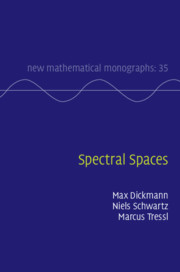Book contents
- Frontmatter
- Contents
- Preface
- An Outline of the History of Spectral Spaces
- 1 Spectral Spaces and Spectral Maps
- 2 Basic Constructions
- 3 Stone Duality
- 4 Subsets of Spectral Spaces
- 5 Properties of Spectral Maps
- 6 Quotient Constructions
- 7 Scott Topology and Coarse Lower Topology
- 8 Special Classes of Spectral Spaces
- 9 Localic Spaces
- 10 Colimits in Spec
- 11 Relations of Spec with Other Categories
- 12 The Zariski Spectrum
- 13 The Real Spectrum
- 14 Spectral Spaces via Model Theory
- Appendix The Poset Zoo
- References
- Index of Categories and Functors
- Index of Examples
- Symbol Index
- Subject Index
8 - Special Classes of Spectral Spaces
Published online by Cambridge University Press: 08 March 2019
- Frontmatter
- Contents
- Preface
- An Outline of the History of Spectral Spaces
- 1 Spectral Spaces and Spectral Maps
- 2 Basic Constructions
- 3 Stone Duality
- 4 Subsets of Spectral Spaces
- 5 Properties of Spectral Maps
- 6 Quotient Constructions
- 7 Scott Topology and Coarse Lower Topology
- 8 Special Classes of Spectral Spaces
- 9 Localic Spaces
- 10 Colimits in Spec
- 11 Relations of Spec with Other Categories
- 12 The Zariski Spectrum
- 13 The Real Spectrum
- 14 Spectral Spaces via Model Theory
- Appendix The Poset Zoo
- References
- Index of Categories and Functors
- Index of Examples
- Symbol Index
- Subject Index
Summary
So far we have mostly studied arbitrary spectral spaces. In this chapter and the next we focus on special classes of spectral spaces. There are many different possibilities to choose some class of spaces and analyze properties of its members or of the entire class. Our choice of special classes is prompted by applications. Of course, one may also be interested in a class of spaces for some other reason (e.g., because its members, or the class as a whole, have a particularly rich structure theory).
In commutative algebra and classical algebraic geometry, Noetherian rings play a fundamental role. The spectra of Noetherian rings are Noetherian spaces, which are the subject matter of Section 8.1. Beyond their importance in algebraic geometry, the class of Noetherian spaces also has remarkable properties as a subclass of all topological spaces. For an example, see 11.1.12 and its corollaries. The inverse spaces and the patch spaces of Noetherian spaces are scattered, the rank function is equal to the Cantor–Bendixson rank of its inverse space, cf. 8.1.25. In Section 8.2 we analyze spectral spaces with scattered patch spaces. In particular, we show that every countable scattered Boolean space is the patch space of some Noetherian space, 8.2.3.
In Section 8.3 we turn to Heyting spaces. They are the spectra of Heyting algebras, a class of bounded distributive lattices occurring in the algebraic formulation of intuitionistic logic. Heyting algebras and Heyting spaces will be used in Chapter 9, where we study localic spaces, which are the spectra of frames (see A.6(xv)). Frames are special Heyting algebras, hence localic spaces are special Heyting spaces.
A spectral space is normal if each point specializes to a unique closed point. This condition has important consequences for the structure of a space. Normal spectral spaces are studied in Section 8.4. They occur as the Zariski spectra of commutative Gelfand rings. Moreover, every spectral root system is normal (but not vice versa). Section 8.5 is devoted to spectral root systems and their inverse spaces, the spectral forests. Therefore, much information about spectral forests follows immediately from the study of spectral root systems. Real spectra of rings, cf. Section 2.5 and Chapter 13, are root systems and are of fundamental importance in real algebraic geometry.
- Type
- Chapter
- Information
- Spectral Spaces , pp. 246 - 298Publisher: Cambridge University PressPrint publication year: 2019



